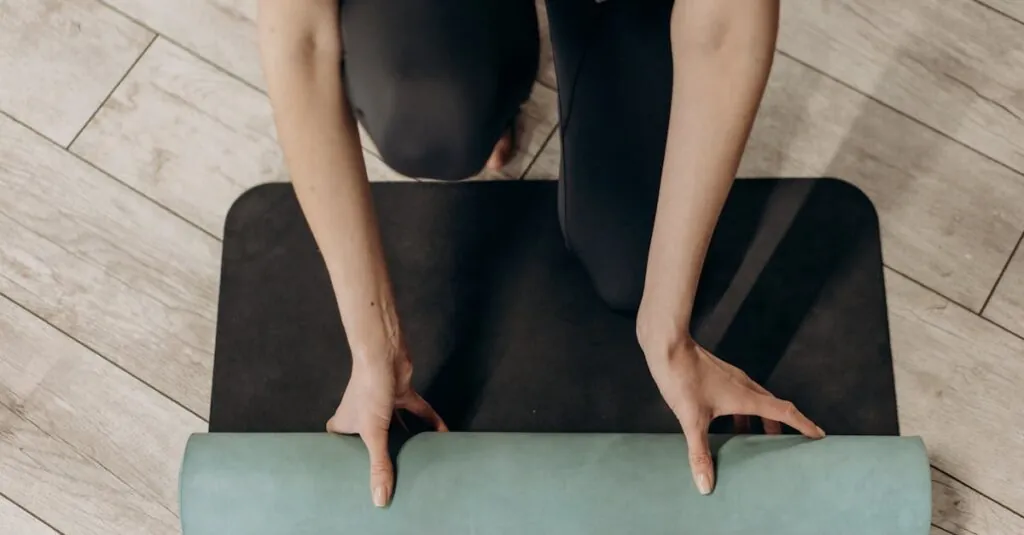In a world overflowing with distractions, sticking to good habits can feel like trying to find a needle in a haystack—blindfolded. Enter the habit accountability partner, the trusty sidekick everyone needs on their journey to self-improvement. They’re not just there to cheer you on; they’re the ones who’ll call you out when you’re about to binge-watch another season of that show instead of hitting the gym.
Table of Contents
ToggleWhat Is A Habit Accountability Partner?
A habit accountability partner is someone who actively helps another person maintain their commitment to personal goals. This partner serves as a support system, offering encouragement when motivation wanes. They monitor progress, check in regularly, and provide constructive feedback. Individuals often choose friends, colleagues, or family members for this role.
A significant aspect of a habit accountability partner is the mutual responsibility for habit formation. Both parties agree to share their goals and regularly discuss their progress. Transparency fosters trust and strengthens the partnership, making the journey toward self-improvement more engaging.
Many individuals report improved success rates when working with an accountability partner. Research indicates that setting specific goals alongside another person can enhance commitment. The partner helps keep focus during challenging times, helps navigate distractions, and helps celebrate achievements, big or small.
Specific techniques can increase the effectiveness of this partnership. Regular check-ins—whether daily, weekly, or bi-weekly—create a structured environment for communication. Partners may use different methods to track progress, including habit-tracking apps or shared journals. Maintaining flexibility in conversations about progress also ensures that feedback remains constructive and motivating.
Establishing clear expectations is vital in this relationship. Both individuals should agree on what success looks like and how they will support one another. Recognizing that everyone faces setbacks encourages resilience and promotes long-term growth. A good habit accountability partner can transform the challenge of habit formation into a collaborative and rewarding experience.
Benefits Of Having A Habit Accountability Partner
A habit accountability partner significantly supports personal growth. By providing encouragement and tracking progress, this partnership enhances motivation.
Enhanced Motivation
Having an accountability partner boosts motivation levels. Regular check-ins encourage individuals to stay focused on their goals. They often celebrate small victories together, which generates positive reinforcement. When facing challenges, having someone to share these moments with can renew determination. This dynamic creates an environment where individuals feel inspired to push through barriers. Partnerships thrive on shared enthusiasm, making the journey towards better habits more enjoyable.
Increased Commitment
An accountability partner fosters a greater sense of commitment. Individuals often experience heightened responsibility when they know someone else is invested in their success. Clear expectations set by both partners create a mutual sense of obligation. Frequent discussions about progress lead to deeper reflections on goals. As a result, this accountability helps individuals stay aligned with their intentions and feel more dedicated to their paths. Consistency thrives when both parties actively support each other.
Improved Goal-Setting
A habit accountability partner sharpens goal-setting abilities. They offer valuable perspectives that lead to more realistic and achievable objectives. Constructive feedback from a partner can highlight areas for improvement. Additionally, those engaged in this process tend to define specific, measurable outcomes, ensuring clarity in their ambitions. Setting milestones alongside an accountability partner transforms abstract goals into tangible steps. Collaboration results in a more refined approach to personal growth, strengthening the habit-forming journey.
How To Find The Right Habit Accountability Partner
Finding the right habit accountability partner involves thoughtful consideration and clear communication. Key factors play a critical role in establishing a successful partnership.
Assessing Compatibility
Assess compatibility by identifying shared goals and interests. Individuals should reflect on their personal objectives and choose someone whose aspirations align with theirs. Factors like availability and communication styles also matter. Understanding how frequently to connect can enhance the partnership. Assessing personal values helps ensure mutual respect and motivation. Consider whether the partner is supportive and encouraging, fostering a collaborative environment. Discussing past experiences with habits can offer insight into how both individuals handle challenges. Ultimately, compatibility increases the chances of maintaining motivation and accountability.
Setting Clear Expectations
Setting clear expectations defines the partnership dynamic. Individuals must articulate their goals and establish how they’ll support each other. Discussing preferred communication methods, such as phone calls or messaging, ensures both partners stay connected. Frequency of check-ins should align with each person’s needs; whether daily or weekly can make a difference in accountability. Establishing specific metrics for tracking progress fosters transparency. Encouraging honest feedback allows both partners to adjust their approaches as needed. Clarity in expectations not only motivates both parties but also strengthens the commitment to shared success.
Tips For An Effective Accountability Partnership
Engaging with a habit accountability partner involves clear strategies that enhance the partnership’s effectiveness. Implementing these strategies can significantly improve the likelihood of achieving personal goals.
Regular Check-Ins
Frequent check-ins bolster communication and commitment. Scheduling weekly or bi-weekly meetings maintains momentum. During these sessions, individuals can share progress, challenges, and reflections on their goals. Structuring check-ins around specific questions can streamline discussions. Asking what worked well, what didn’t, and what adjustments are necessary fosters accountability. Establishing a routine provides a sense of expectation, helping partners stay motivated and focused on their objectives. Regular engagement also builds trust, as both individuals become invested in each other’s journeys.
Constructive Feedback
Offering constructive feedback nurtures growth and improvement. Partners must create a safe space for honest discussions about each other’s habits. Providing specific examples can clarify suggestions and highlight areas for enhancement. Encouraging perspectives on successes ensures balanced feedback, not just criticism. Positive reinforcement along with constructive criticism promotes a healthy dialogue. Sharing insights on difficult aspects of habit formation leads to more effective problem-solving. This collaborative approach reinforces a supportive environment that fosters resilience and long-term commitment to personal goals.
Finding the right habit accountability partner can be a game changer in the journey of personal growth. This partnership not only boosts motivation but also fosters a sense of responsibility that enhances commitment to goals. Regular check-ins and open communication create a supportive environment where individuals can thrive.
By embracing setbacks as learning opportunities and celebrating successes together, partners cultivate resilience and long-term dedication. Ultimately, the collaborative nature of this relationship transforms habit formation into a more engaging and rewarding experience. With the right partner by their side, individuals can navigate challenges more effectively and achieve their aspirations with greater ease.









